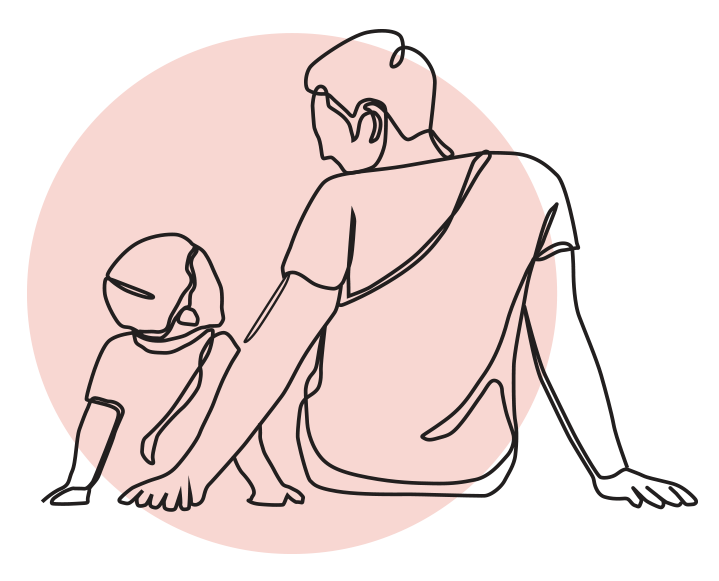The National Eating Disorder Charity, Beat, estimates that around 1.25 million people in the UK have an eating disorder. Read on for a better understanding of eating disorders and how to help as a parent.
What is an Eating Disorder?
There are a lot of stereotypes that shape people’s perceptions of eating disorders. The truth is that it’s a very complicated mental illness and anyone, regardless of gender, age, ethnicity or background can develop one.
If you are wondering whether you or someone you love may have an eating disorder then a question you might consider is…
Is this person experiencing distress in relation to food or the body?
While there is a huge spectrum of severity most people who are experiencing this kind of distress would really benefit from support and treatment.
A common misconception that perhaps prevents people from seeking help is that you must look a certain way or be incredibly thin to have an eating disorder whereas in fact less than 10% of people with an eating disorder will in fact be underweight. It’s important to remember that eating disorders are mental illnesses where people use disordered eating to cope with difficult situations or feelings. The way that person behaves around food might make them feel more in control as a way of managing high anxiety. It’s never their fault, and specialist help is essential.
It is relatively common for children and young people to develop some difficulties with their eating at some stage. Food is the first thing we can say ‘NO’ to, so it is an obvious place to exercise the need for control when a child or young person is feeling out of control. Perhaps it’s no surprise that eating disorders have increased in the wake of the COVID pandemic given its correlation to feelings of being ‘out of control’. There was also difficulty accessing support for many during lockdown, which might have led to those in the early stages being left untreated for too long.
Eating Disorder Treatment & Outcomes
Eating disorders can be treated and improve significantly in many cases so it’s important to talk to your GP about your concerns. Around half of young people significantly improve with treatment within one year. Young people’s outcomes are much improved if they’re treated early and if the whole family engages in therapy. It’s very difficult for families to get the right balance between putting down boundaries and providing support in the face of the distorted thinking that characterises those suffering from the illness and family therapy can make a big difference to everyone.
Once a young person has had the disorder for more than three years it does become much more difficult to treat and can become a long-term condition. Because of the impact on physical health, this is a mental health issue that can be life-threatening in the most serious of cases. It’s important to note that medical staff need to work together with mental health professionals to treat young people holistically so any private therapeutic support you set up should at the very least be linked up with your GP.

Where Do I Find Out More?
If you are worried about you or someone you care about having an eating disorder we recommend the National Eating Disorder charity, BEAT – follow this link for further resources or call their helpline on 0808 801 0677. Your first port of call will also, as with any other illness be your GP. Eating disorders affect the whole family so it’s important for parents to seek help themselves. BEAT does sessions for families as well.
Types of Eating Disorders
The diagnosis of an ‘eating disorder’ covers a range of mental health illnesses where there are abnormal or disturbed eating habits that affect a person’s ability to function. Anorexia Nervosa and Bulimia Nervosa are the most well-known, but others include, Binge eating, Purging (could be using diet pills), Avoidant/Restrictive Food Disorder (ARFID), night eating syndrome and Orthorexia which is an obsession with healthy eating. Anorexia Nervosa typically involves restricting food, losing weight, and secret exercise together with a deep fear of being fat. Orthorexia can look like a need for ‘pure clean food’ has sadly been perpetuated by Instagram’s clean eating movements and is a lot harder to regulate as it can look like ‘healthy’ eating. However, removing fats and sugars from the diet in fact leads to weight loss and nutritional deficiencies as well as the mental struggle of the disorder. For information about the other types of eating disorders visit the BEAT website.
Protecting Children Online
The reality is that there is a lot of harmful content online that encourages children to engage in eating disorder behaviours, over-exercising, and dieting. But there is some good news since the Online Safety Act in October 2023 which was passed to protect children from ‘primary priority content’ including posts that promote eating disorders. The largest platforms are now expected to give parents the tools to ‘filter’ harmful content. On January 9th 2024 Instagram and Facebook announced that they will block under-18s from seeing harmful eating disorder, suicide, and self-harm content. Instead, they’ll be directed to content from mental health charities for help. As a parent it’s important to try and work out which connections are helpful and which are less helpful (or harmful) for your child.
Encouraging Healthy Eating Habits in Children
It’s normal for toddlers to be ‘fussy’ eaters so the less we fuss, the better. They usually grow out of it and aren’t related to an eating disorder. That said, children who start dieting younger are at greater risk of developing eating disorders, so one thing we can do as parents is support our children to have a healthy body image, rather than equating success with a particular kind of look.
It is always helpful to model a healthy attitude toward our own bodies and to seek help if this is already an area of personal difficulty. Parents can be aware of how food is talked about at home and avoid judging other people (on TV as well as friends) for the way they look. Helping children/young people to balance a healthy food intake with exercise can start in a relaxed way from an early age.
If you think you or a loved one might have an eating disorder, visit the National Eating Disorder Charity, BEAT online or call their helpline 0808 801 0677.




